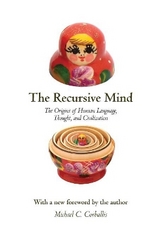
Recursive Mind (eBook)
The Origins of Human Language, Thought, and Civilization
eBook Download:
Notice: Trying to get property 'ebookformat' of non-object in /var/www/webshop-frontend/module/Lehmannsportal/view/lehmannsportal/book/view.phtml on line 238
Warning: Invalid argument supplied for foreach() in /var/www/webshop-frontend/module/Lehmannsportal/view/lehmannsportal/book/view.phtml on line 238
Notice: Trying to get property 'ebookformat' of non-object in /var/www/webshop-frontend/module/Lehmannsportal/view/lehmannsportal/book/view.phtml on line 238
Warning: Invalid argument supplied for foreach() in /var/www/webshop-frontend/module/Lehmannsportal/view/lehmannsportal/book/view.phtml on line 238
2011
|
1. Auflage
288 Seiten
Princeton University Press (Verlag)
978-1-4008-3833-2 (ISBN)
288 Seiten
Princeton University Press (Verlag)
978-1-4008-3833-2 (ISBN)
Zu diesem Artikel existiert eine Nachauflage
The Recursive Mind challenges the commonly held notion that language is what makes us uniquely human. In this compelling book, Michael Corballis argues that what distinguishes us in the animal kingdom is our capacity for recursion: the ability to embed our thoughts within other thoughts. 'I think, therefore I am,' is an example of recursive thought, because the thinker has inserted himself into his thought. Recursion enables us to conceive of our own minds and the minds of others. It also gives us the power of mental 'time travel'-the ability to insert past experiences, or imagined future ones, into present consciousness.
Drawing on neuroscience, psychology, animal behavior, anthropology, and archaeology, Corballis demonstrates how these recursive structures led to the emergence of language and speech, which ultimately enabled us to share our thoughts, plan with others, and reshape our environment to better reflect our creative imaginations. He shows how the recursive mind was critical to survival in the harsh conditions of the Pleistocene epoch, and how it evolved to foster social cohesion. He traces how language itself adapted to recursive thinking, first through manual gestures, then later, with the emergence of Homo sapiens, vocally. Toolmaking and manufacture arose, and the application of recursive principles to these activities in turn led to the complexities of human civilization, the extinction of fellow large-brained hominins like the Neandertals, and our species' supremacy over the physical world.
The Recursive Mind challenges the commonly held notion that language is what makes us uniquely human. In this compelling book, Michael Corballis argues that what distinguishes us in the animal kingdom is our capacity for recursion: the ability to embed our thoughts within other thoughts. "e;I think, therefore I am,"e; is an example of recursive thought, because the thinker has inserted himself into his thought. Recursion enables us to conceive of our own minds and the minds of others. It also gives us the power of mental "e;time travel"e;--the ability to insert past experiences, or imagined future ones, into present consciousness.Drawing on neuroscience, psychology, animal behavior, anthropology, and archaeology, Corballis demonstrates how these recursive structures led to the emergence of language and speech, which ultimately enabled us to share our thoughts, plan with others, and reshape our environment to better reflect our creative imaginations. He shows how the recursive mind was critical to survival in the harsh conditions of the Pleistocene epoch, and how it evolved to foster social cohesion. He traces how language itself adapted to recursive thinking, first through manual gestures, then later, with the emergence of Homo sapiens, vocally. Toolmaking and manufacture arose, and the application of recursive principles to these activities in turn led to the complexities of human civilization, the extinction of fellow large-brained hominins like the Neandertals, and our species' supremacy over the physical world.
| Sprache | englisch |
|---|---|
| Themenwelt | Sachbuch/Ratgeber ► Gesundheit / Leben / Psychologie ► Psychologie |
| Geisteswissenschaften ► Philosophie ► Sprachphilosophie | |
| Geisteswissenschaften ► Psychologie ► Allgemeine Psychologie | |
| Geisteswissenschaften ► Psychologie ► Verhaltenstherapie | |
| Geisteswissenschaften ► Sprach- / Literaturwissenschaft ► Sprachwissenschaft | |
| Naturwissenschaften ► Biologie ► Evolution | |
| Sozialwissenschaften ► Politik / Verwaltung | |
| ISBN-10 | 1-4008-3833-9 / 1400838339 |
| ISBN-13 | 978-1-4008-3833-2 / 9781400838332 |
| Haben Sie eine Frage zum Produkt? |
Mehr entdecken
aus dem Bereich
aus dem Bereich
Strategien und Hilfen für die Alltagsbewältigung
eBook Download (2024)
Kohlhammer Verlag
25,99 €
wie wir Herausforderungen gelassen begegnen
eBook Download (2024)
Piper Verlag
16,99 €



